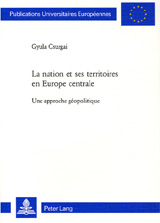Introducing Gyula Csurgai
 Dr Gyula Csurgai is geopolitics courses director of International Centre for Geopolitical Studies, lecturer in geopolitics in academic and professional circles and author of several studies and publications.
Dr Gyula Csurgai is geopolitics courses director of International Centre for Geopolitical Studies, lecturer in geopolitics in academic and professional circles and author of several studies and publications.
In this interview, Mr Csurgai gives his vision on the self-determination of people and possible consequences of Kosovo’s independece.
Interview
What are the main conclusions of your book on the national question in Central Europe, called “La nation et ses territoires en Europe centrale”
 In the main conclusions, I insist on the necessity to go beyond the centralised Nation-state model and I argue for the limitation of external self-determination that includes secession and creation of a new state.
In the main conclusions, I insist on the necessity to go beyond the centralised Nation-state model and I argue for the limitation of external self-determination that includes secession and creation of a new state.
The solutions for multi-ethnic regions in Central and South-East of Europe should be based on different forms of autonomies in a federalist structure. These territorial arrangements could respect the territorial integrity of states and satisfy the different ethno-cultural communities to maintain their identities.
How do current developments in Kosovo fit within these conclusions?
In my view the unilateral declaration of Independence of Kosovo will have negative consequences on the solution I advocate in my book. A fragmentation process both in the Eastern and Western Europe can speed up as the Kosovo situation created a precedent. Spain, Belgium, France and Italy, among other states, can be affected by growing demands for session.
With the demographic changes that take place in Europe, we can imagine also situations when Muslim communities becoming a majority in some European cities and regions and will claim the principle of self-determination in about 50 years.
What scenarios do you consider most likely for Central Europe the coming decade?
We have to differentiate Central Europe from the Balkans due to the cultural, geographic and historical differences. Central European states are EU members. Borders are open between these countries and these countries integrate quickly into a German dominated “Mittel Europa”. The Central European region has good economic and political perspectives. Slovenia has better indicators in many segments of the economy than Portugal for instance.
Regional policies and trans-border cooperation are very important tools to maintain identities in multi-ethnic regions. The main issue is the integration of the Balkan region into a coherent and functional economic framework. This will be a long process and the risk of further destabilisation exists: disintegration of Bosnia, future of Macedonia, among others.
